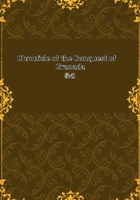
第82章
While perfect unity of object and harmony of operation gave power to the Christian arms, the devoted kingdom of Granada continued a prey to internal feuds. The transient popularity of El Zagal had declined ever since the death of his brother, and the party of Boabdil was daily gaining strength; the Albaycin and the Alhambra were again arrayed against each other in deadly strife, and the streets of unhappy Granada were daily dyed in the blood of her children. In the midst of these dissensions tidings arrived of the formidable army assembling at Cordova. The rival factions paused in their infatuated brawls, and were roused to a temporary sense of the common danger.
They forthwith resorted to their old expedient of new-modelling their government, or rather of making and unmaking kings. The elevation of El Zagal to the throne had not produced the desired effect; what, then, was to be done? Recall Boabdil el Chico and acknowledge him again as sovereign? While they were in a popular tumult of deliberation Hamet Aben Zarrax, surnamed El Santo, rose among them. This was the same wild, melancholy man who had predicted the woes of Granada. He issued from one of the caverns of the adjacent height which overhangs the Darro, and has since been called the Holy Mountain. His appearance was more haggard than ever, for the unheeded spirit of prophecy seemed to have turned inwardly and preyed upon his vitals. "Beware, O Moslems," exclaimed he, "of men who are eager to govern, yet are unable to protect. Why slaughter each other for El Chico or El Zagal? Let your kings renounce their contests, unite for the salvation of Granada, or let them be deposed."
Hamet Aben Zarrax had long been revered as a saint--he was now considered an oracle. The old men and the nobles immediately consulted together how the two rival kings might be brought to accord. They had tried most expedients: it was now determined to divide the kingdom between them, giving Granada, Malaga, Velez Malaga, Almeria, Almunecar, and their dependencies to El Zagal, and the residue to Boabdil el Chico. Among the cities granted to the latter Loxa was particularly specified, with a condition that he should immediately take command of it in person, for the council thought the favor he enjoyed with the Castilian monarchs might avert the threatened attack.
El Zagal readily agreed to this arrangement: he had been hastily elevated to the throne by an ebullition of the people, and might be as hastily cast down again. It secured him one half of a kingdom to which he had no hereditary right, and he trusted to force or fraud to gain the other half hereafter. The wily old monarch even sent a deputation to his nephew, making a merit of offering him cheerfully the half which he had thus been compelled to relinquish, and inviting him to enter into an amicable coalition for the good of the country.
The heart of Boabdil shrank from all connection with a man who had sought his life, and whom he regarded as the murderer of his kindred. He accepted one half of the kingdom as an offer from the nation, not to be rejected by a prince who scarcely held possession of the ground he stood on. He asserted, nevertheless, his absolute right to the whole, and only submitted to the partition out of anxiety for the present good of his people. He assembled his handful of adherents and prepared to hasten to Loxa. As he mounted his horse to depart, Hamet Aben Zarrax stood suddenly before him. "Be true to thy country and thy faith," cried he; "hold no further communication with these Christian dogs. Trust not the hollow-hearted friendship of the Castilian king; he is mining the earth beneath thy feet. Choose one of two things: be a sovereign or a slave--thou canst not be both."
Boabdil ruminated on these words; he made many wise resolutions, but he was prone always to act from the impulse of the moment, and was unfortunately given to temporize in his policy. He wrote to Ferdinand, informing him that Loxa and certain other cities had returned to their allegiance, and that he held them as vassal to the Castilian Crown, according to their convention. He conjured him, therefore, to refrain from any meditated attack, offering free passage to the Spanish army to Malaga or any other place under the dominion of his uncle.*
*Zurita, lib. 20, c. 68.
Ferdinand turned a deaf ear to the entreaty and to all professions of friendship and vassalage. Boabdil was nothing to him but as an instrument for stirring up the flames of civil war. He now insisted that he had entered into a hostile league with his uncle, and had consequently forfeited all claims to his indulgence; and he prosecuted with the greater earnestness his campaign against the city of Loxa.
"Thus," observes the worthy Fray Antonio Agapida, "thus did this most sagacious sovereign act upon the text in the eleventh chapter of the evangelist St. Luke, that 'a kingdom divided against itself cannot stand.' He had induced these infidels to waste and destroy themselves by internal dissensions, and finally cast forth the survivor, while the Moorish monarchs by their ruinous contests made good the old Castilian proverb in cases of civil war, 'El vencido vencido, y el vencidor perdido' (the conquered conquered, and the conqueror undone)."*
*Garibay, lib. 40, c. 33.